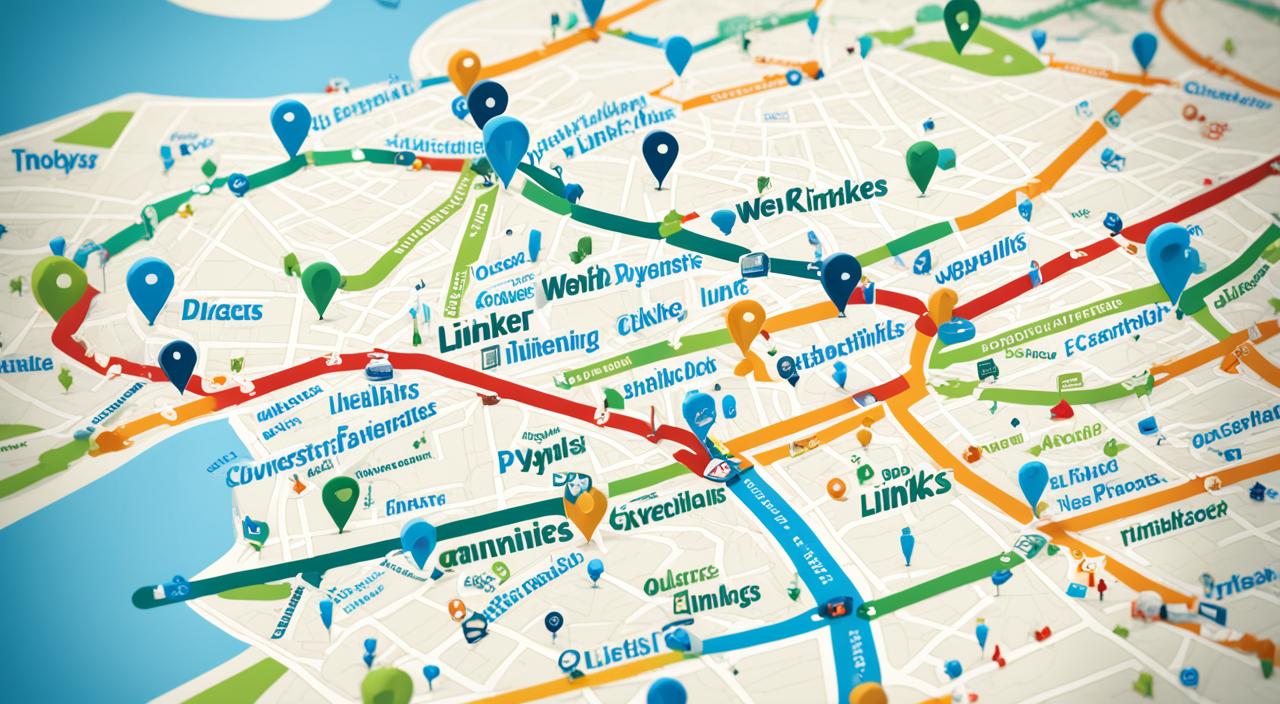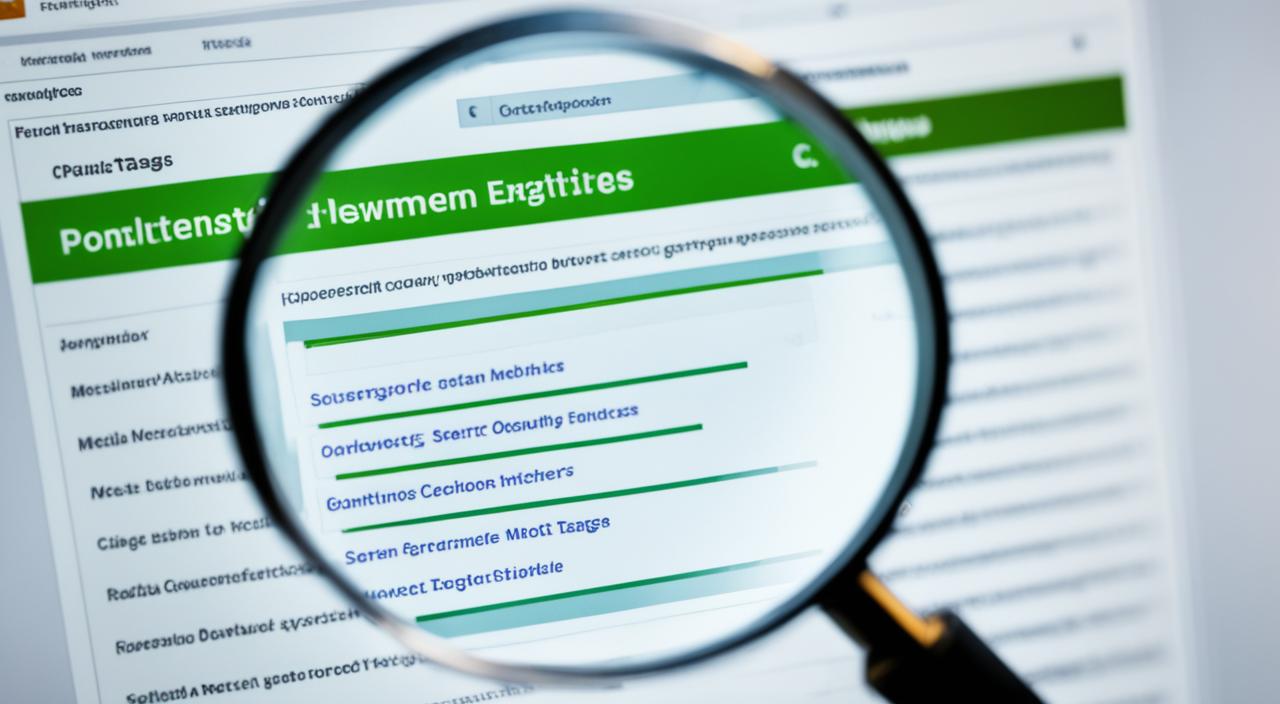
Social Signals SEO: Navigating the Impact of Social Media Presence
Did you know that social signals can indirectly impact a website’s authority and credibility in the eyes of search engines? While there is no direct evidence that social signals directly influence SEO rankings, the engagement and visibility they generate on social media platforms have a significant impact on a website’s digital presence.
Key Takeaways:
- Social signals, such as likes, shares, and comments, indirectly contribute to a website’s authority and credibility in the eyes of search engines.
- A well-executed social media strategy can lead to improved brand exposure, content distribution, and local SEO efforts.
- Strong social engagement can attract backlinks and mentions from influential figures, enhancing a website’s reputation and SEO performance.
- Active and engaged social media presence can drive traffic to a website, increasing click-through rates and dwell time, both valued by search engines.
- Integrating social media and SEO strategies can amplify the impact of social signals and improve overall SEO performance.
The Social Signal SEO Factor
Although the direct impact of social signals on SEO rankings is a subject of debate, it is widely recognized that strong social media engagement can indirectly influence a website’s authority and credibility. Social signals, such as likes, shares, and comments on platforms like Facebook, Twitter, and Instagram, demonstrate the popularity and relevance of content.
An interesting aspect of social signals is their ability to attract backlinks and mentions from other websites and influencers. When content goes viral on social media, it creates a buzz and catches the attention of users who may reference or link to it in their own content. This increased exposure can enhance a website’s reputation in the eyes of search engines, adding to its overall credibility.
Furthermore, an active and engaged social media presence can drive traffic to a website, positively impacting its click-through rate and dwell time. Click-through rate refers to the number of users who click on a website’s link in search engine results, while dwell time is the duration a user spends on a website after clicking a link. These actions are considered valuable indicators of content quality and relevance by search engines.
“Social engagement, such as likes, shares, and comments, can indirectly contribute to a website’s authority and credibility in the eyes of search engines.”

Maximizing the Impact
To fully harness the potential of social signals for SEO, it is important to focus on the quality and credibility of the content being shared on social media platforms. By creating valuable and shareable content, businesses can increase the likelihood of engagement and increase the potential for backlinks and mentions.
Additionally, actively participating in relevant conversations on social media and engaging with the audience can help strengthen a brand’s identity and reputation. This, in turn, can positively impact search engine rankings as search engines consider brand signals and social media presence as indicators of trustworthiness and authority.
Integrating social media and SEO strategies is crucial for maximizing the impact of social signals. By aligning content strategies across social media platforms and the website, businesses can amplify the visibility and influence of their social signals. This includes optimizing social media profiles with relevant keywords, fostering engagement with the audience, and utilizing social listening to identify opportunities for content creation.
Social Media and Link Building
Social media is a powerful tool for enhancing link building strategies in SEO. By sharing valuable content on social media platforms, businesses have the opportunity to reach a wider audience and increase the chances of their content being shared by influential figures in the industry. This organic sharing can lead to the acquisition of high-quality backlinks, which are essential for improving a website’s search engine rankings.
Establishing a strong social media presence also opens doors for influencer collaborations and partnerships. By collaborating with influential individuals in their niche, businesses can further enhance their link profile and strengthen their overall SEO efforts. Influencer collaborations not only generate high-quality backlinks but also help businesses promote their content to a larger and more engaged audience.
“Social media provides businesses with a unique opportunity to build valuable relationships with influencers, who can play a significant role in link building and content promotion.” – [Your Name], SEO Expert
When businesses share their content on social media, it increases the chances of it being discovered by relevant websites and individuals who may link to it. This increased exposure and content promotion on social media contribute to the overall SEO value of a website. By leveraging the power of social media, businesses can attract more attention to their content, leading to improved search engine rankings and higher website authority.
Furthermore, utilizing social media platforms allows businesses to engage with their target audience directly. By actively participating in conversations and sharing valuable content, businesses can nurture relationships with their followers and encourage them to share their content, thereby increasing the chances of acquiring backlinks.
To illustrate the importance of social media in link building, consider the following scenario:
- A business shares a well-researched and informative article on social media.
- Many individuals find the article valuable and decide to share it on their own websites and blogs.
- These shared links serve as high-quality backlinks to the original article, signaling to search engines that the content is trustworthy and authoritative.
- The increased visibility and backlink acquisition improve the website’s search engine rankings and overall SEO performance.
By incorporating social media into their link building strategies, businesses can harness the power of social signals, attract high-quality backlinks, and improve their SEO rankings.

Having covered the link between social media and link building in SEO, the next section will delve into the increased brand exposure and brand signals that can result from a strong social media presence.
Increased Brand Exposure and Brand Signals
Social media is a powerful tool for enhancing brand exposure and recognition. Through active participation in social media conversations, sharing relevant content, and engaging with the audience, businesses can strengthen their brand’s identity and reputation. This, in turn, has a positive impact on trustworthiness and authority in the eyes of search engines.
By strategically leveraging social media platforms, businesses can create brand signals that contribute to their overall online presence. Brand mentions and social media presence are key indicators of credibility and influence, which search engines take into account when determining search rankings. A robust social media presence can significantly improve visibility in search engine results pages (SERPs) and attract clicks and visits from users seeking more information about the brand.
“Active participation and engagement on social media platforms increase brand visibility, allowing businesses to establish themselves as industry leaders and authoritative voices in their niche.”
Brand exposure through social media extends beyond the platform itself. When businesses actively engage with their audience, share valuable content, and participate in industry discussions, they increase the likelihood of others mentioning their brand. These brand mentions serve as valuable signals of trustworthiness and authority, further strengthening their online presence and impacting their SEO performance.
Furthermore, a strong social media presence allows businesses to showcase their expertise and build a loyal community around their brand. By providing valuable and shareable content, businesses can attract a wider audience and establish themselves as thought leaders in their industry. This positive brand reputation translates into increased trust and authority in the eyes of both users and search engines.
Key Takeaways:
- A robust social media presence enhances brand exposure and recognition.
- Social media signals, such as brand mentions and engagement, contribute to a brand’s trustworthiness and authority.
- Search engines consider brand signals when determining search rankings.
- Active participation and engagement on social media platforms increase brand visibility.
- Brand mentions on social media and other platforms strengthen a brand’s reputation and influence.
Social Media as a Content Distribution Channel
Social media platforms are more than just spaces for sharing updates and connecting with friends. They have evolved into powerful tools for content distribution, allowing businesses to reach a wider audience and expand their online presence.
When high-quality content is shared on social media, it has the potential to resonate with users and encourage content sharing. Each share increases the reach and visibility of the content, exposing it to a broader audience and increasing the likelihood of it being discovered by individuals who might link to it from their websites. This organic acquisition of backlinks enhances the content’s overall SEO value.
Effective content distribution through social media can significantly improve a website’s visibility and reach. By leveraging the power of social media, businesses can tap into new networks, engage with potential customers and industry influencers, and ultimately drive more traffic to their websites.
Benefits of Content Distribution through Social Media:
- Wider Audience: Sharing content on social media exposes it to a larger, more diverse audience, reaching beyond the website’s existing visitor base.
- Content Sharing: Social media encourages content sharing, helping to increase its visibility and reach organically.
- Content Quality: Sharing high-quality content on social media can enhance a brand’s reputation and credibility, attracting more users and potential backlinks.
- Content Discovery: By leveraging social media platforms, businesses can increase the chances of their content being discovered by individuals who may link to it from their websites, boosting its SEO value.
As businesses continue to navigate the digital landscape, they must recognize the importance of social media as a content distribution channel. By developing a strong social media presence and sharing valuable content, businesses can expand their online reach, attract a wider audience, and improve their overall SEO performance.
Local SEO and Social Media
For businesses with a physical presence, leveraging social media platforms can greatly impact local SEO efforts. By utilizing location tagging, geotagging, and location-specific hashtags, businesses can optimize their visibility in local searches and map listings.
Consistent use of these features helps businesses appear in front of users searching for products or services in their vicinity, increasing their chances of attracting relevant local traffic and potential customers.
“Social media plays a pivotal role in boosting local SEO by allowing businesses to geographically target their audience and engage with potential customers in real-time. By incorporating location tagging and geotagging into social media posts and using location-specific hashtags, businesses can improve their chances of appearing in local search results. This targeted approach not only enhances local visibility but also encourages local users to visit physical stores, leading to greater conversions and business growth.”
Optimizing Local SEO with Social Media
When using social media for local SEO, it’s important to:
- Include relevant location tags: Tagging the location in social media posts helps search engines understand the geographical relevance of the content and can improve local search visibility.
- Geotag social media content: Geotagging adds geographical metadata to social media posts, making them more discoverable to users searching for location-specific information.
- Utilize location-specific hashtags: Incorporating location-specific hashtags helps businesses reach a targeted local audience and increases the chances of appearing in location-based searches.
By implementing these strategies, businesses can strengthen their local SEO presence and attract customers who are actively looking for products or services in their area.
Defining Social Signals in SEO
Social signals, such as likes, shares, comments, and overall engagement on social media platforms, provide indicators of content relevance, authority, and user satisfaction. These signals reflect how users interact with and perceive the content, contributing to its overall credibility and impact. When users engage with a piece of content by liking, sharing, or commenting on it, they are essentially endorsing it and signaling its value to others.
Although search engines have not explicitly confirmed that social signals directly influence search rankings, there is evidence to suggest that they play an indirect role in SEO performance. The interpretation of these signals by search engines can influence a website’s search rankings, as they indicate the user’s satisfaction and the content’s relevance and authority.
Understanding how social signals are perceived by search engines is crucial for optimizing content and improving SEO performance. By creating high-quality and engaging content that resonates with the target audience, businesses can attract more social signals and enhance their chances of ranking well in search engine results.
Importance of Social Signals
Social signals provide valuable insights into the reception and impact of content on social media platforms. The number of likes, shares, and comments a piece of content receives indicates its popularity, reach, and level of engagement. When users find value in a particular post or article, they are more likely to interact with it and share it with their own networks, amplifying its visibility and potential impact.
“Social signals act as a validation for search engines, indicating that the content is relevant, valuable, and resonates with the target audience. The more social signals a piece of content receives, the more likely search engines are to view it as reliable and authoritative.”
Social signals also contribute to content authority. When users engage with and endorse a piece of content, it establishes the content’s credibility and authority within its niche or industry. This can attract more backlinks, mentions, and citations from other websites, further strengthening its reputation in the eyes of search engines.
The Role of Social Signals in SEO
While search engines have not explicitly confirmed social signals as a direct ranking factor, they do consider factors such as user satisfaction, content relevance, and content authority when determining search rankings. Therefore, social signals indirectly influence a website’s search rankings by contributing to these factors.
Search engines aim to provide users with the most relevant and valuable content in their search results. Social signals act as a form of crowd validation, indicating to search engines that the content is resonating with users and is likely to be valuable. This can influence how search engines evaluate and prioritize content, potentially boosting its visibility and ranking in search results.
Furthermore, social signals can drive traffic to a website, increasing its click-through rate and dwell time. Search engines interpret these metrics as indicators of content quality and relevance, potentially impacting the website’s search rankings. The more users engage with content and spend time on a website, the more likely search engines are to view it as valuable and deserving of higher rankings.
Optimizing Social Signals for SEO
To optimize social signals for SEO, businesses should focus on creating high-quality and engaging content that resonates with their target audience. This involves understanding the interests, preferences, and needs of the audience and tailoring the content to meet those expectations.
Additionally, businesses can encourage social engagement by implementing clear calls-to-action within their content, inviting users to like, share, or comment on their posts. Engaging with users on social media platforms and fostering a sense of community can also contribute to increased social signals.
It is important to note that quantity alone is not the sole indicator of success when it comes to social signals. The quality and relevance of the engagement are equally important. Focus on fostering meaningful interactions and attracting social signals from influential users and relevant communities to enhance the impact of social signals on SEO.
By understanding and harnessing the power of social signals, businesses can improve their online visibility, increase brand authority, and enhance their overall SEO performance.
Integrating Social and SEO Strategies
To maximize the impact of social signals on SEO, it is essential to integrate social media and SEO strategies. By aligning content strategies across social media platforms and the website, businesses can amplify the visibility and influence of social signals.
Creating valuable and shareable content is key to attracting engagement and increasing social signals. By providing content that resonates with the target audience, businesses can encourage likes, shares, and comments, which are all valuable social signals.
Remember, quality content is the cornerstone of effective social media and SEO strategies. Focus on creating meaningful and informative content that provides value to your audience.
In addition to content creation, optimizing social media profiles with relevant keywords is crucial. By incorporating these keywords into the social media bio, descriptions, and posts, businesses can enhance their visibility in both social media searches and search engine results.
Influencer collaborations
Collaborating with influencers in your industry can also contribute to amplifying social signals and improving SEO performance. When influencers share your content or mention your brand, it not only increases visibility but also lends credibility and authority to your website.
Partnering with influencers who have a strong social media presence can broaden your reach and attract new audiences, leading to increased social signals and improved SEO outcomes.
To foster engagement on social media, businesses should actively respond to comments, messages, and mentions. This interaction demonstrates responsiveness and builds a sense of community, incentivizing users to engage further.
By integrating social media and SEO strategies, businesses can leverage the power of social signals to enhance their online presence and optimize their SEO performance.
Key Takeaways:
- Align content strategies across social media platforms and the website to maximize the visibility of social signals.
- Create valuable and shareable content to encourage engagement and increase social signals.
- Optimize social media profiles with relevant keywords to enhance visibility in social media searches and search engine results.
- Collaborate with influencers to amplify social signals and improve SEO performance.
- Foster engagement on social media by actively responding to comments, messages, and mentions.
Can Social Media Signals Improve SEO Ranking?
The relationship between social media signals and search engine ranking is a topic that continues to be a subject of debate among experts in the field. While there is no definitive evidence to support the direct impact of social media signals on SEO rankings, there is growing evidence to suggest that these signals indirectly contribute to improved online visibility and brand recognition.
When it comes to SEO, social media signals play a significant role in reputation management, brand visibility, and user engagement. By effectively utilizing social media platforms, businesses can enhance their overall online presence and indirectly contribute to improved search engine rankings.
One of the key benefits of social media signals is their impact on reputation management. Through social media platforms, businesses can actively engage with their audience, respond to customer feedback, and address any concerns or issues. By managing their online reputation effectively, businesses can build trust and credibility, which are essential factors considered by search engines when determining website rankings.
Additionally, social media signals also contribute to brand visibility. A robust social media presence allows businesses to reach a wider audience, generate more brand impressions, and increase brand exposure. This increased visibility can lead to increased website traffic, which is another important factor in search engine ranking algorithms.
Furthermore, social media signals play a crucial role in user engagement. When users engage with a brand’s social media content, such as liking, sharing, or commenting on posts, it indicates that the content is resonating with the audience. This user engagement is perceived by search engines as a measure of content quality and relevance.
“Utilizing social media effectively can enhance a website’s overall online presence and indirectly contribute to improved search engine rankings.”
By consistently producing high-quality content and fostering user engagement on social media platforms, businesses can improve their social media signals and, in turn, enhance their SEO performance.
Although the direct influence of social media signals on search engine rankings may be debatable, their impact on reputation management, brand visibility, and user engagement cannot be ignored. Businesses that leverage social media effectively can enhance their online presence and indirectly contribute to improved search engine rankings.
Conclusion
The relationship between social signals and SEO is intricate and multifaceted. Although there is no definitively proven direct causation between social signals and search engine rankings, the impact of social media on SEO cannot be underestimated. When incorporated strategically, social media can significantly contribute to enhanced online visibility, brand recognition, effective content distribution, and localized SEO efforts, all of which are vital for improving an organization’s online presence in the ever-evolving digital landscape.
By understanding the synergy between social media and SEO strategies, businesses can navigate the complex digital terrain and optimize their online presence for maximum impact. While social signals may not directly affect search engine rankings, the engagement and visibility they generate on social media platforms indirectly enhance a website’s authority and credibility in the eyes of search engines. By implementing effective social media and SEO strategies, businesses can establish a strong online presence and ensure that their brand resonates with their target audience.
To make the most out of social signals and SEO, businesses should focus on creating valuable and shareable content, optimizing their social media profiles with relevant keywords, and fostering engagement and interaction on social media platforms. By aligning their content strategies across social media and their website, businesses can amplify the visibility and influence of their social signals, leading to a more robust and effective SEO performance.
In conclusion, social media’s impact on SEO remains essential and should not be underestimated. By embracing social media and incorporating it into an overall SEO strategy, businesses can strengthen their online presence, improve their brand visibility, and stay ahead in the dynamic digital landscape. As social media and search engine algorithms continue to evolve, it is crucial for businesses to adapt and leverage these digital platforms to maximize their impact on SEO and achieve sustainable growth.
FAQ
How do social signals impact SEO?
While there is no direct evidence that social signals directly impact SEO rankings, the engagement and visibility they generate on social media platforms can indirectly affect a website’s authority and credibility in the eyes of search engines.
Can social media help improve my website’s social signals?
Yes, a well-executed social media strategy can contribute to improved brand exposure, content distribution, and local SEO efforts, which in turn can lead to stronger social signals for your website.
Does social media help with link building for SEO?
Absolutely! By sharing valuable content on social media platforms, businesses have a higher chance of it being shared by others, including influential figures in the industry, leading to the organic acquisition of backlinks.
How does social media impact brand exposure and recognition?
Active participation in social media conversations, sharing relevant content, and engaging with the audience can strengthen a brand’s identity and reputation. Search engines take into account brand signals such as brand mentions and social media presence as indicators of trustworthiness and authority.
How can social media help with content distribution?
When you share high-quality content on social media platforms, you can reach a wider audience and encourage content sharing. The more your content is shared and engaged with on social media, the higher the chances of it being discovered by individuals who might link to it from their websites.
Can social media impact local SEO efforts?
Yes, by utilizing location tagging, geotagging, and location-specific hashtags, businesses can optimize their visibility in local searches and map listings, increasing their chances of attracting relevant local traffic and potential customers.
How are social signals defined in SEO?
Social signals, such as likes, shares, comments, and overall engagement on social media platforms, provide indicators of content relevance, authority, and user satisfaction.
How can I integrate social and SEO strategies?
To maximize the impact of social signals on SEO, it is essential to integrate social media and SEO strategies. By creating valuable and shareable content, optimizing social media profiles with relevant keywords, and fostering engagement on social media, businesses can enhance their social signals and improve their overall SEO performance.
Do social media signals directly influence SEO rankings?
The debate on whether social media signals directly impact SEO rankings continues. While there is evidence to suggest that social signals indirectly contribute to improved online visibility and brand recognition, their direct influence on search engine rankings is still a topic of discussion.
How does social media impact a website’s online presence?
The relationship between social signals and SEO is complex and multifaceted. While there is no definitive evidence of direct causation between social signals and search engine rankings, the impact of social media on SEO cannot be ignored. When incorporated strategically, social media can contribute to enhanced online visibility, brand recognition, content distribution, and local SEO efforts.









